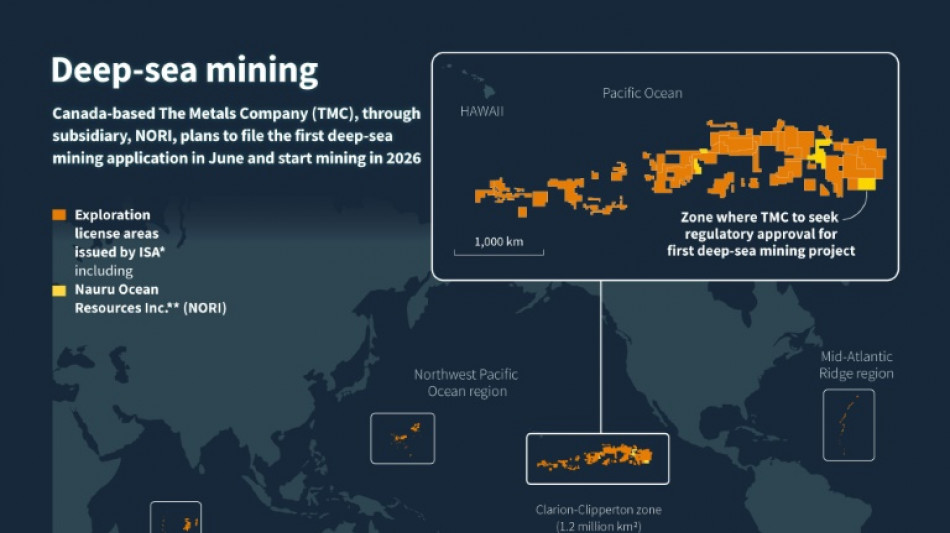
-
 Almeida wins time-trial to take Tour of Switzerland
Almeida wins time-trial to take Tour of Switzerland
-
Bublik sees off Medvedev to claim second title on grass in Halle

-
 Feyi-Waboso banned for England tour to Argentina
Feyi-Waboso banned for England tour to Argentina
-
US strikes on Iran: what we know

-
 Alcaraz crowned king of Queen's for second time
Alcaraz crowned king of Queen's for second time
-
US says strikes 'devastated' Iran's nuclear program
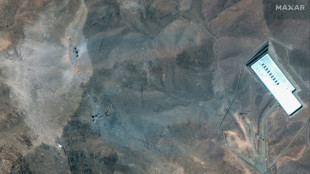
-
 Bublik sees off Medvedev to claim fifth AFP title in Halle
Bublik sees off Medvedev to claim fifth AFP title in Halle
-
Freed Belarus opposition figure urges Trump to help release all prisoners

-
 Wave of syringe attacks mar France's street music festival
Wave of syringe attacks mar France's street music festival
-
US intervention 'devastated' Iran's nuclear programme says Pentagon
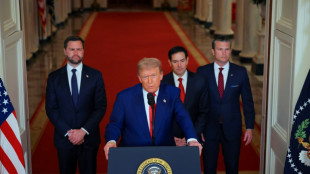
-
 Marc Marquez completes perfect Mugello weekend with Italian MotoGP triumph
Marc Marquez completes perfect Mugello weekend with Italian MotoGP triumph
-
Vondrousova warms up for Wimbledon with Berlin title

-
 India still on top in first Test despite Brook fifty for England
India still on top in first Test despite Brook fifty for England
-
Ukraine army chief vows to expand strikes on Russia

-
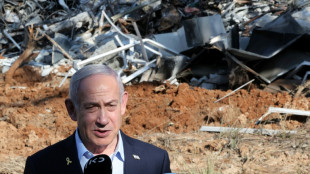 United behind Iran war effort, Israelis express relief at US bombing
United behind Iran war effort, Israelis express relief at US bombing
-
Former England fast bowler David Lawrence dead at 61

-
 At least three impacts in Israel during Iran missile attacks, 23 hurt
At least three impacts in Israel during Iran missile attacks, 23 hurt
-
Trump says US strikes 'obliterated' Iran nuclear sites
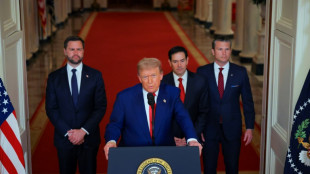
-
 Japan's high-tech sunscreens tap into skincare craze
Japan's high-tech sunscreens tap into skincare craze
-
Tesla expected to launch long-discussed robotaxi service

-
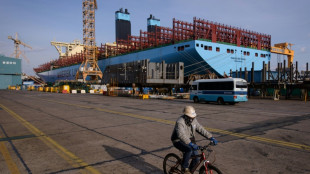 South Korea counts on shipbuilding to ease US tariff woes
South Korea counts on shipbuilding to ease US tariff woes
-
Bombing Iran, Trump gambles on force over diplomacy

-
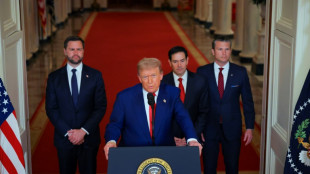 Trump says US attack 'obliterated' Iran nuclear sites
Trump says US attack 'obliterated' Iran nuclear sites
-
Itoje to Valetini: five to watch when the Lions face Australia

-
 Wallabies confident but wary of wounded British and irish Lions
Wallabies confident but wary of wounded British and irish Lions
-
Utopia and fragile democracy at Art Basel fair

-
 Freed Israeli hostage recounts 484-day nightmare in Gaza
Freed Israeli hostage recounts 484-day nightmare in Gaza
-
River Plate frustrated by Monterrey in 0-0 stalemate

-
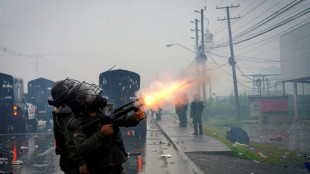 Panama cuts internet, cell phones in restive province
Panama cuts internet, cell phones in restive province
-
Tens of thousands join pro-Palestinian marches across Europe

-
 Coach Penney unsure of return to Super Rugby champions Crusaders
Coach Penney unsure of return to Super Rugby champions Crusaders
-
Trump says US 'obliterated' Iran nuclear sites, threatens more
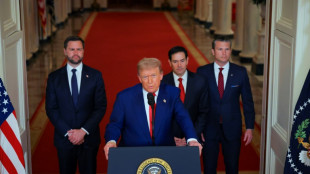
-
 Olympic chief Kirsty Coventry's steeliness honed by hard knocks
Olympic chief Kirsty Coventry's steeliness honed by hard knocks
-
Outgoing IOC president Thomas Bach faced mammoth challenges

-
 Maro Itoje comes of age with Lions captaincy
Maro Itoje comes of age with Lions captaincy
-
Trump says US bombs Iran nuclear sites, joining Israeli campaign

-
 In New York, Vermeer show reveals art of the love letter
In New York, Vermeer show reveals art of the love letter
-
Ex-members of secret US abortion group fear return to dark era

-
 Trump says US launched 'very successful' attack on Iran nuclear sites
Trump says US launched 'very successful' attack on Iran nuclear sites
-
Man City squad must be trimmed: Guardiola

-
 Minjee Lee grabs four-shot lead at 'brutal' Women's PGA Championship
Minjee Lee grabs four-shot lead at 'brutal' Women's PGA Championship
-
Olympic balloon rises again in Paris

-
 Inter Milan, Dortmund claim first wins at Club World Cup
Inter Milan, Dortmund claim first wins at Club World Cup
-
South American teams lay down the gauntlet to Europe at Club World Cup

-
 Fleetwood grabs PGA Travelers lead as top-ranked stars fade
Fleetwood grabs PGA Travelers lead as top-ranked stars fade
-
'Lucky' Lamothe hat-trick guides Bordeaux-Begles into Top 14 final

-
 Lamothe hat-trick guides Bordeaux-Begles into Top 14 final
Lamothe hat-trick guides Bordeaux-Begles into Top 14 final
-
UK PM Starmer says Kneecap should not perform Glastonbury

-
 Inter Milan strike late to beat Urawa Reds at Club World Cup
Inter Milan strike late to beat Urawa Reds at Club World Cup
-
Dortmund stars hide from sun at Club World Cup 'sauna'
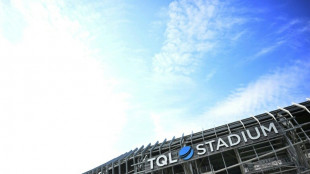

Why are proposed deep-sea mining rules so contentious?
After more than a decade of negotiations, a new round of talks to finalize a code to regulate deep-sea mining in international waters begins Monday in Jamaica, with hopes high for adoption this year.
The International Seabed Authority (ISA), an independent body established in 1994 under a UN convention, has been working since 2014 on the new rules for developing mineral resources on the ocean floor.
The huge task has gathered pace, under pressure from corporate concerns eager to cash in on the untapped minerals.
Canada's The Metals Company plans to file the first commercial mining license request in June, through its subsidiary Nori (Nauru Ocean Resources Inc.), which hopes to extract polymetallic nodules from the Pacific.
Here is a look at the proposed rules, and why they have sparked intense debate:
- What does this mining code entail? -
Under the UN Convention on the Law of the Sea (UNCLOS), the ISA must both oversee any exploration or mining of coveted resources (such as cobalt, nickel, or manganese) in international waters, and protect the marine environment.
For activists worried about the protection of hard-to-reach ocean ecosystems, this twin mandate is nonsensical. Some groups, and more and more countries, are asking for a moratorium on seabed mining.
With no consensus, the ISA-led negotiations have continued.
The ISA Council, made up of 36 of the authority's 169 member states, will spend the next two weeks trying to bridge the gaps on finalizing the code.
They are working from a 250-page "consolidated text" already riddled with parenthetical changes, and comments on disagreements.
But then there are dozens of amendments filed by countries, companies and non-governmental organizations.
Emma Wilson of the Deep Sea Conservation Coalition told AFP there were "over 2,000 textual elements that are still being discussed -- and that those debates were "not close to being resolved."
- How would seabed mining work? -
Any entity wishing to obtain a contract to mine the ocean floor must be sponsored by a specific country.
Those applications for mining licenses would first go through the ISA's legal and technical commission, which NGOs say is too pro-industry and opaque.
The commission would evaluate the financial, technical and environmental aspects of the proposed plans, and then make a recommendation to the ISA Council, the final decision-maker.
But some worry that rules already set by UNCLOS would make it too difficult to reject any favorable recommendations.
The draft code calls for initial contracts lasting 30 years, followed up with extensions of five years at a time.
- What about environmental protection? -
Potential mining companies must conduct a survey of the possible environmental risks of their activities, but details on these surveys are still up in the air, with negotiators not yet even agreed on how to define the terms.
More and more countries, along with NGOs, highlight that even the idea of surveying potential impact is effectively impossible, given the lack of scientific data about the zones.
And some Pacific states insist that the code explicitly state the need to protect "underwater cultural heritage," but that is under debate.
- What about compliance? -
The draft text calls for inspections and evaluations for deep-sea mining companies, but how such a system would work is under debate. Some even think such mechanisms are ultimately not all that feasible.
- Will there be profit-sharing? -
Under UNCLOS, resources on the ocean floor are seen as the "common heritage of mankind."
The mining code under consideration stipulates that each company must pay royalties to the ISA based on the value of the metals. But what percentage should they pay?
A working group has proposed royalties of anywhere from three to 12 percent, while African states believe 40 percent is more just.
S.Abdullah--SF-PST

